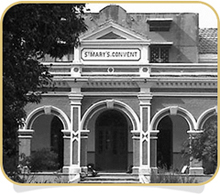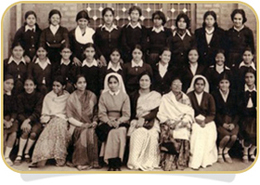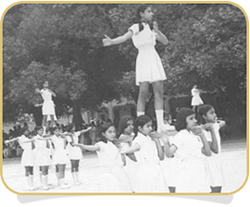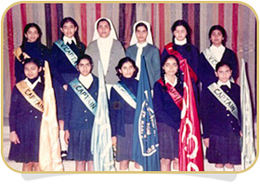
The history of St.
Mary's Convent, Allahabad, rests on the foundation of the Congregation
of Jesus (the former Institute of Blessed Virgin Mary) by our Venerable foundress
Mary Ward, who believed firmly that "Women in time to come will do great things!"
We are a part of a journey which began with
Mary Ward in 1585. In response to the needs of her time, Mary Ward founded
the Institute in 1609, to cater to the education of girls, with the special emphasis
on moral and spiritual foundation.

Inspired by her zeal and enthusiasm, the CJ sisters
came to India at an invitation from
Bishop Anastasius Hartmann, to the then Superior General of the CJ sisters,
Mother Catherine de Graccho, in Nymphenburg - Germany. The pioneers to India, a
group of five young sisters from Germany set out in 1853 across the oceans to the
unknown strange land of India. After reaching Bombay by ship, they embarked upon
a perilous journey across the vast peninsula of India in a Bullock cart and reached
Patna, where they founded the first house and school in India,
St. Joseph's Convent, Patna.

In the years that followed, these brave women and others who followed them worked
whole - heartedly to spread God's Kingdom in the Indian subcontinent, establishing
new convents and reaching out to the poor and needy in the northern parts of India
through the ministries of education, health care, care of youth and orphans. In
the year 1866, Bishop Anastasius
Hartmann intended to open a new Convent of the
IBMV (CJ) sisters in Allahabad and appealed to Mother General for more sisters.
By the time the 8th Party of sisters arrived in India, the Convent and Boarding
school at Phaphamau was almost ready. The sisters moved into the Convent of January
1ih, 1866. On January 15th, 1866, the boarding school was opened with two pupils, Mary Elise and Nina Frizzone.

Though the number of students increased gradually, since the sisters had to face
endless problems in Phaphamau, they first shifted to
Elgin Road in Allahabad, then temporarily to Lowther Castle and finally in February
1888 (or 1886), to 32 Thornhill Road (Maharishi Dayanand Road), where we are today.
The Catholic Diocese of Allahabad had offered a piece of leased land, within the
campus of St. Joseph's Cathedral to the sisters to build their school, where a spacious
red-brick building had been
erected. The original building exists to this day, and is considered one of the
Heritage buildings of the city on account of its unique architectural style. Around
it many other structures have been constructed in the course of years to accommodate
the ever increasing number of students.
DELVING INTO THE PAST
St. Mary's Convent is a name synonymous with education, values, culture and
a sense of responsibility. Till now, SMC was like a tale untold, a glorious saga
of selfless work done by the missionaries in the Allahabad province.
Flipping through the logbooks and the old records, we tried to peek into the past,
which at first seemed like a purple haze, but as the haze cleared itself, with each
page unfolding a new story, it brought forth the eternal legend of St. Mary's Convent
- as witnessed by the walls and corridors of this edifice.
145 years back, a dream named SMC began with a vision 'spe labor levis' (Latin)
- hope lightens work. We all know that our school was established in 1866, and after
reading more about its foundation, we come to know about its beginnings in Phaphamau,
and how, later in the 19th Century, it came to Allahabad. But with it was born St.
Anne's, also known as the Convent girls free school, or the Catholic free school.
The earliest records that are available are those dated back to 1866 when St. Anne's
and St. Mary's existed as two separate schools in the same compound. The present
Primary school building was in fact the place where St. Anne's stood.
The schools were run by the missionaries with the aid of extended funds by the British
Government and the local municipal corporations.
There is a few such mentions of
grants given to the schools by the Red Cross society.
The schools were under the strict supervision of the inspector of European schools
in charge of the North Western Provinces and Oudh.
As the 20th Century dawned, it marked its beginning by the celebrations of the 50
years of apostleship of IBMV in India in 1904, at the end of which the student count
reached 90. In 1927, the name day of the school was for the first time celebrated
by all the pupils on the 8th of September. The school had an active participation
from the students.
On the 15th of August, 1947, the students of St. Mary's high school and St. Anne's
middle school performed together in the music hall while they jointly celebrated
the historic event of India having achieved independence and of welcoming the new
Bishop of Allahabad diocese.
St. Anne's did untold good to the poor of Allahabad until in 1947, after the independence,
all the children were admitted in St. Mary's. The former St. Anne's was renovated
and became the Teachers' Training College in 1950. Much later, the TTC was shifted
to where it is presently, and the former building is now the Primary school.
Early in 1948, Mahatma Gandhi's assassination was mourned with a memorial service
in the cathedral.
In 1954, under Rev. Mother Angela, half days on Saturdays were introduced. And in
1960, Rev. Mother Hermine introduced our first ever uniform - navy blue pleated
skirts with white blouses and monograms.
INSPIRING CENTENARY CELEBRATIONS (1866-1966)
In the April issue of "Catholicus" Fr. A. G. Rego wrote: "A Centenary is always
a landmark in the history of any institution. But the celebration of an educational
and missionary institution, in a land like India, is an event pregnant with meaning
and expectancy; on occasion like this the past and the present merge with the future
to bring out the message and efforts of those who in the past have laboured and
spent themselves and the vigour and dynamism of those who today carry on the noble
traditions, to witness the Light, the Truth and the Life, to make Christ known where
He is well nigh a stranger, and to plant the Church in receptive virgin soil.
Rev. Mother Hermine (the superior of St. Mary's Convent) organized with the help
of her devoted community, staff and students elaborate celebrations from 18th
to 23rd Feb.
There were religious, cultural, social, intellectual and physical
activities - all planned on a colossal scale to mark such an important event. What
must have impressed all those who attended the celebrations was the sense of divine,
which was given due importance and emphasis, and which ran like a golden thread
through all the festivities."
Compiled by
Shivani Saran
Arpita Chandra
Class 12
(Session - 2009-2010)